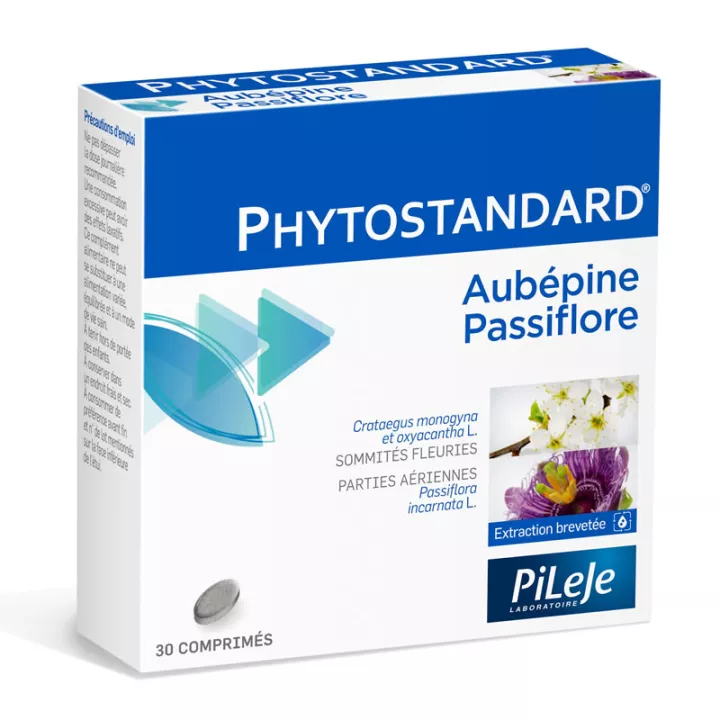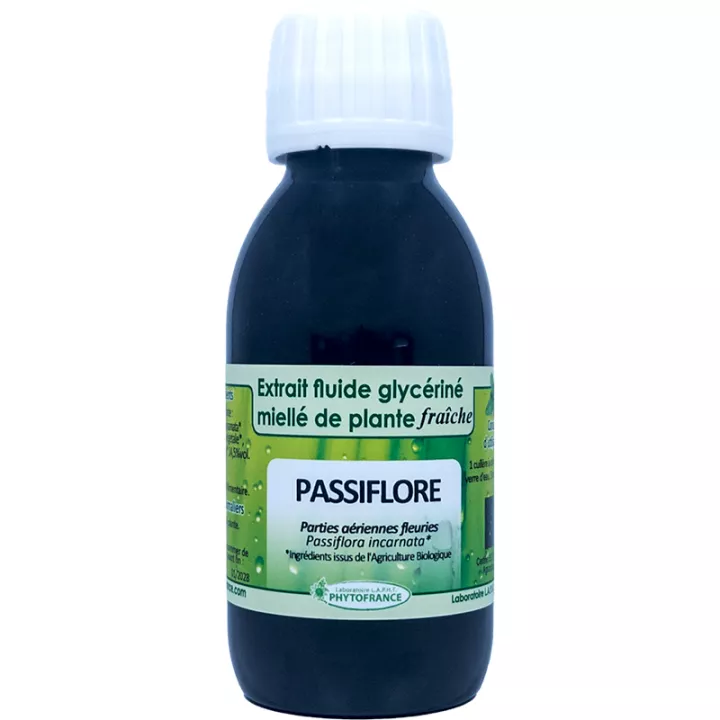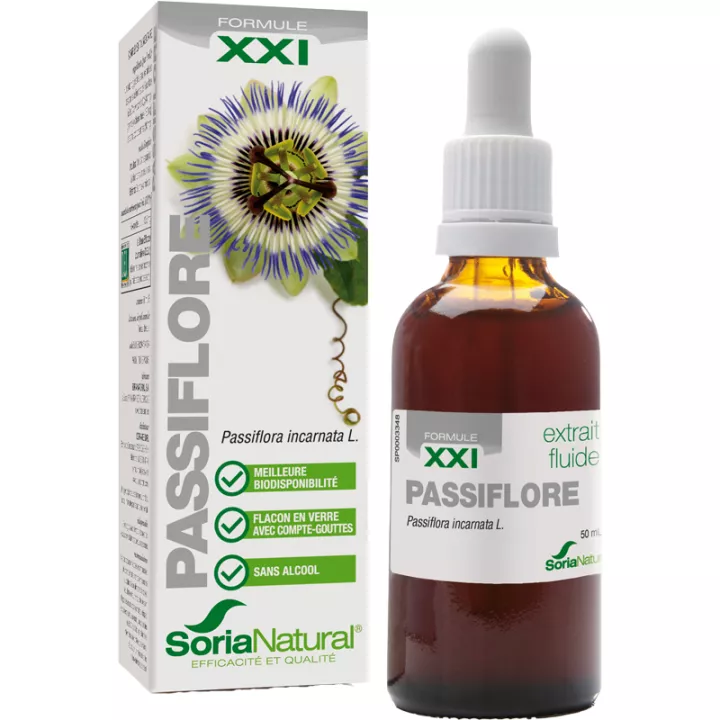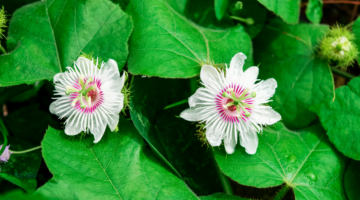Passiflorine sugar-free drinkable solution is a plant-based dietary supplement with sweetener. It has been formulated with active ingredients of 100% plant origin, rigorously selected to help, naturally, to cope with stress and disturbed sleep.
Passiflorine - Drinkable Solution to Reduce Nervousness and Palpitations
Discover Passiflorine, the sugar-free drinkable solution to reduce nervousness and palpitations. Made with passionflower and hawthorn, this natural dietary supplement promotes restful sleep. Choose Passiflorine and enjoy a calmer, more serene life.
PASSIFLORINE, drinkable solution in 125ml bottle. Food supplement used to reduce nervousness, particularly :
- in case of exaggerated heartbeat perception (palpitations) after any heart disease has been ruled out;
- sleep disorders.
Reference : 3078818
Insomnia is the reduction in the usual duration of sleep and/or the impairment of sleep quality, with repercussions on the quality of the next day's sleep. During the night, the quantity of sleep is reduced by difficulties in falling asleep, nocturnal awakenings and waking up too early in the morning. Sleep is experienced as light and unrestful. The next day is difficult, with complaints of fatigue, drowsiness and irritability, often accompanied by mood disorders.
There are various explanations for sleep disorders. Environmental causes (noise, heat, etc.), unhealthy lifestyle habits (too much activity in the evening, coffee or alcohol abuse), an inappropriate imposed rhythm (night shift or shift work), an associated organic disease that disrupts sleep (asthma, angina, peptic ulcer, gastro-oesophageal reflux disease, etc.) or even the use of stimulant medications (theophylline, salbutamol, cortisone, beta-blockers ....) are often at the root of sleep disorders.
How to take Passiflorine
Periods of stress/nervousness: 1 to 2 teaspoons, noon and evening. Repeat if necessary.
Difficulty falling asleep / sleeping: 2 to 4 teaspoons. Take in the evening before bedtime.
One teaspoon is equivalent to 5 ml. Dilute the solution in a little water.
Plunge into a state of deep serenity with Passiflorine, the sugar-free drinkable solution specially formulated to reduce nervousness and promote restful sleep. Made with passionflower and hawthorn, this natural solution is the ideal dietary supplement to soothe your mind and regain inner balance. Don't let nervousness and palpitations deprive you of a serene life. Discover the unique benefits of Passiflorine today.
Reduce Nervousness and Palpitations
Say goodbye to the nervousness that prevents you from making the most of every moment. Passiflorine is specially designed to give you peace of mind, thanks to its high-quality natural ingredients. Passionflower is renowned for its soothing properties, helping to calm agitated thoughts and ease nervous tension. Combined with hawthorn, this drinkable solution works synergistically to bring you deep relaxation. You can finally free yourself from the exaggerated perception of heartbeat, more commonly known as palpitations, and regain a harmonious heart rhythm. Thanks to Passiflorine, your heart will beat in harmony with your peaceful mind.
Restore restful sleep
Sleep is essential to recharge your batteries and wake up feeling refreshed every morning. Unfortunately, sleep disorders can disrupt this essential recovery. Passiflorine is your ally in restoring peaceful nights and restorative sleep. The relaxing benefits of passionflower and hawthorn help you let go and drift off into a deep, restorative sleep. Say goodbye to restless nights and frequent awakenings. Enjoy a rejuvenating rest that will enable you to face each day with energy and vitality.
A natural solution for your well-being
Passiflorine is much more than just a dietary supplement. It's an invitation to take care of yourself in a natural, balanced way. Unlike the chemicals often used to treat nervousness and sleep disorders, Passiflorine offers a natural, sugar-free alternative that respects your body. It's non-addictive and has no side effects. By choosing Passiflorine, you're choosing harmony with your body and mind. Take advantage of a healthy, natural solution to improve your overall well-being.
What does Passiflorine contain?
No drowsiness upon awakening and no addiction.
Complementary active ingredients.
Passionflower
Passionflower extract is beneficial in cases of stress, thanks to its soothing action. It promotes quality, healthy, restorative sleep.
Hawthorn
Known for its relaxing effect, this plant helps reduce restlessness, tension and irritability, and naturally contributes to better sleep.
Composition per recommended daily dose of 4 teaspoons (20 ml):
- Passionflower extract: 400 mg
- Hawthorn extract: 320 mg
Ingredients: Water; Sweetener: maltitol; Alcohol; Extract of aerial parts of Passion flower (Passiflora incarnata L.); Extract of flowering tops of Hawthorn (Crataegus oxyacantha L.).
Precautions for use
Keep out of sight and reach of children.
For adults only. Do not use on children.
Note alcohol content: 9.4°.
This product should not be used during pregnancy or while breast-feeding.
If you are taking medication, ask your pharmacist or doctor for advice.
Do not exceed the recommended daily dose.
Excessive consumption may have laxative effects.
Dietary supplements should be used as part of a healthy lifestyle and not as a substitute for a varied, balanced diet.
Store away from heat and light.
Packaging
125 ml bottle
This oral solution is manufactured in France, in a GMP-certified laboratory, to the highest quality standards.
Sodium-free. Dye-free. Gluten-free.
Find out more about psychophysiological insomnia
This type of sleep disorder accounts for 15-20% of insomnia. It is an insomnia that appears without any obvious cause. It generally follows insomnia with an identifiable cause: after surgery, the birth of a child, major psychological stress, a shift-work schedule...
There is a negative conditioning to insomnia, which translates into a paradoxical activation of the waking systems as soon as the person goes to bed. This results in fear of not sleeping, tension or anxiety at bedtime, spontaneous falling asleep when sleep is not sought (in front of the TV...), and the impossibility of taking a nap to recover.
To find out more
NOTICE
ANSM - Updated : 16/06/2004
Product name
PASSIFLORINE, drinkable solution in bottle
Capsule
Please read this leaflet carefully before taking this medicine. It contains important information for your treatment.
If you have any further questions or doubts, please ask your doctor or pharmacist for more information.
- Keep this leaflet as you may need to read it again.
- If you need further information or advice, ask your pharmacist.
- If symptoms worsen or persist, consult your doctor.
- If you notice any side effects not listed in this leaflet, or if you experience any of the effects listed as serious, please tell your doctor or pharmacist.
Leaflet summary
In this leaflet :
- WHAT IS PASSIFLORINE, drinkable solution in bottle AND WHAT IS IT USED FOR?
- WHAT DO I HAVE TO KNOW BEFORE TAKING PASSIFLORINE, Oral Solution in Bottle?
- HOW DO I TAKE PASSIFLORINE, Oral Solution in Bottle?
- WHAT ARE THE POSSIBLE SIDE EFFECTS?
- HOW CAN PASSIFLORINE be used?
- ADDITIONAL INFORMATION
1. WHAT IS PASSIFLORINE, oral solution in bottle AND WHAT IS IT USED FOR?
Pharmacotherapeutic class
Herbal medicine.
Therapeutic indications
Traditionally used to reduce nervousness:
-in case of exaggerated perception of heartbeat (palpitations) after any heart disease has been ruled out;
-sleep disorders.
2. WHAT DO I HAVE TO KNOW BEFORE TAKING PASSIFLORINE, oral solution in bottle?
List of information required before taking the medicine
Not applicable.
Contraindications
IF IN DOUBT, ASK YOUR DOCTOR OR PHARMACIST FOR ADVICE.
Precautions for use; special warnings
Use PASSIFLORINE with caution:
Special warnings
If symptoms do not improve, consult your doctor.CAUTION: THE ALCOHOL CONTENT OF THIS MEDICATION IS 11.2°, i.e. 445 mg ETHYL ALCOHOL PER COFFEE SPOON.Precautions for use
In case of diabetes, take into account the sugar intake (1.7 g per teaspoon).
3. HOW TO TAKE PASSIFLORINE, oral solution in bottle?
Instructions for proper use
Not applicable.
Dosage, Method and/or route(s) of administration, Frequency of administration and Duration of treatment
Dosage
FOR ADULTS AND CHILDREN OVER 30 MONTHS.
In adults:
-Nervousness, palpitations: 1 or 2 teaspoons, midday and evening, before meals.
-Sleep disorders: 1 to 4 teaspoons in the evening, before bedtime.
For children over 30 months: 1 teaspoon daily.
Method of administration
Take orally. Dilute the solution in a little water.
Duration of treatment
In case of nervousness or palpitations, treatment may be continued for 2 or 3 periods of 20 days.
4. WHAT ARE THE POSSIBLE SIDE EFFECTS?
Description of side effects
Like all medicines, PASSIFLORINE, oral solution in bottle, is likely to have undesirable effects, although not everyone is subject to them.
If you notice any side effects not listed in this leaflet, or if any side effects become serious, please tell your doctor or pharmacist.
5. HOW TO USE PASSIFLORINE, oral solution in bottle?
Keep out of sight and reach of children.
Expiration date
Do not use PASSIFLORINE, solution buvable en flacon after the expiration date stated on the bottle.
Storage conditions
Protect from light and moisture.
If necessary, warnings against certain visible signs of deterioration
Medicines must not be disposed of down the drain or with household waste. Ask your pharmacist what to do with unused medicines. These measures will help protect the environment.
6. ADDITIONAL INFORMATION
Complete list of active ingredients and excipients
What does PASSIFLORINE, oral solution in bottle, contain?
The active ingredients are:
Passion flower (fluid extract) 10 g
Hawthorn (tincture) 10 g
Per 100 ml drinking solution.
Alcoholic strength (V/V) = 11.2°.
One 5-ml teaspoonful contains 445 mg ethanol and 1.7 g sucrose.
Other components are:
Sucrose, glycerol, sodium methyl parahydroxybenzoate, sodium propyl parahydroxybenzoate, drinking water.
Pharmaceutical form and contents
What PASSIFLORINE is, and what does it contain?
This medicine comes in the form of an oral solution. 125 ml bottle.
Name and address of marketing authorization holder and manufacturing authorization holder responsible for batch release, if different
Holder
Laboratoires THERATECH
20, rue Jean Daudin
75015 Paris, France
Operator
Laboratoires JOLLY-JATEL
28, avenue Carnot
78100 SAINT GERMAIN EN LAYE
Manufacturer
PHARMA DEVELOPPEMENT
Corbigny industrial site
Chemin de Marcy
58800 CORBIGNY










